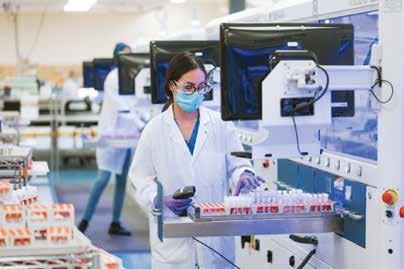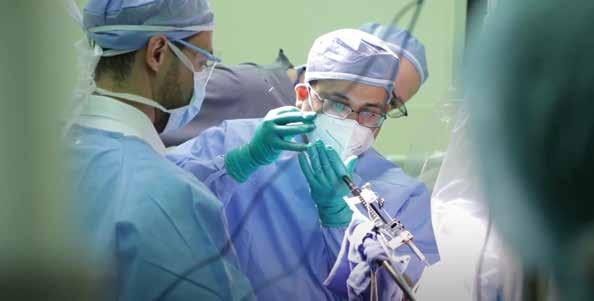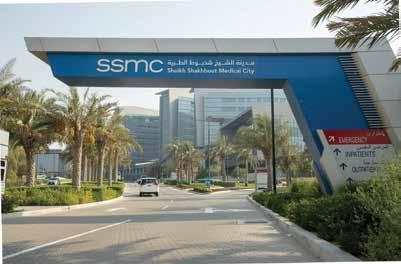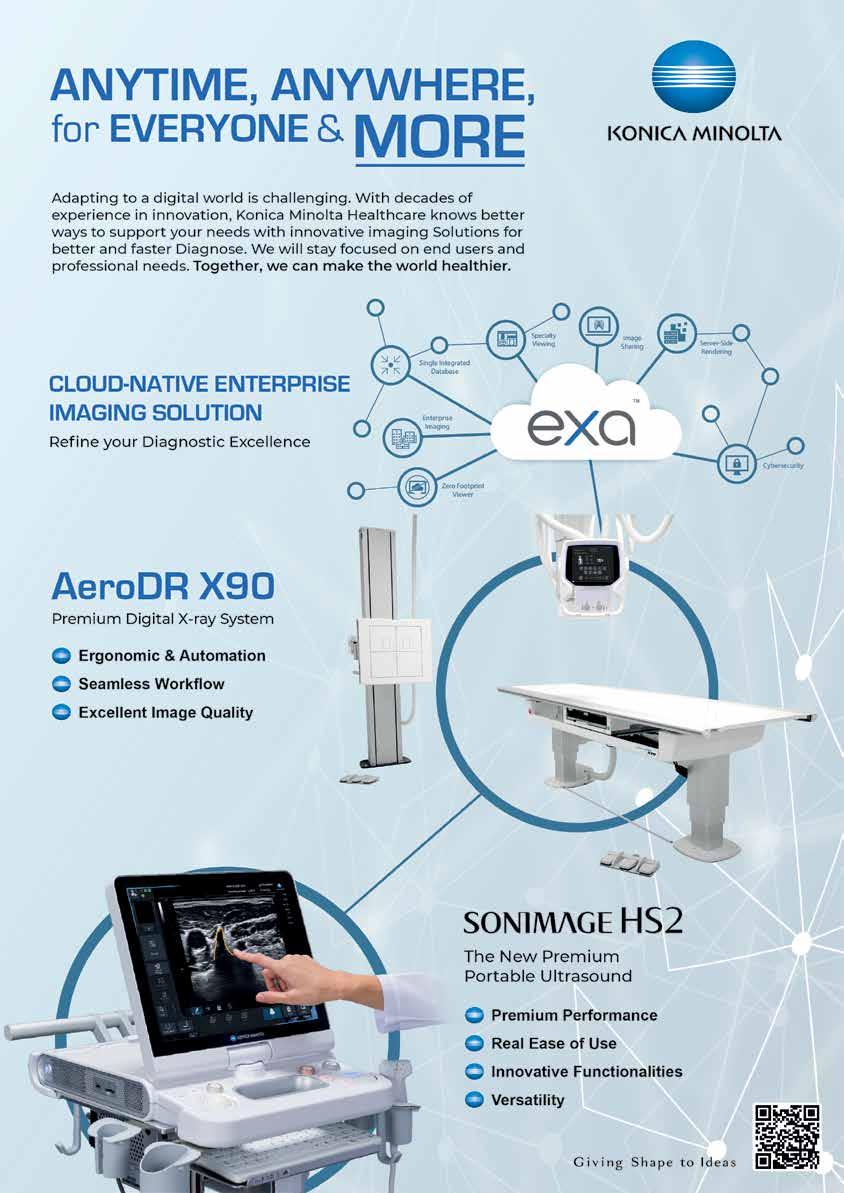
11 minute read
Middle East Monitor
Update from around the region

Mayo Clinic Laboratories and American Hospital Dubai have announce a strategic partnership aimed at improving advanced laboratory diagnostics in the Dubai region. Under the agreement, the two organizations will begin delivering laboratory testing through a collaboration based out of American Hospital Dubai in early 2021.
“Our goal for this relationship is to offer advanced laboratory testing to better help clinicians answer complex medical questions for their patients,” said William Morice II, M.D., Ph.D., president of Mayo Clinic Laboratories. “Effective laboratory diagnostics is critical to improving patient care, and, by bringing this service straight to the region, we are dramatically reducing test turnaround times.”
Mayo Clinic Laboratories and American Hospital Dubai also will work together to improve access to complex laboratory diagnostics for the region’s providers.
The Abu Dhabi Stem Cells Center (ADSCC), in collaboration with Sheikh
Abu Dhabi Stem Cells Centre treats first Emirati patient
Khalifa Medical City, has treated its first Emirati patient through the Abu Dhabi Bone Marrow Transplant program (ADBMT). The transplant was performed in Abu Dhabi, and the patient is recovering well at home.
The AD-BMT program was established by ADSCC in August 2020 and has been treating patients since its inception in collaboration with Sheikh Khalifa Medical City. The AD-BMT program relies on stem cell therapy to treat patients with hematological and oncological illnesses, including bone marrow transplantation, which is an established stem cell-based treatment for a number of blood malignancies. These include multiple myeloma, plasma cell leukemia, large diffuse B-cell lymphoma, and Hodgkin lymphoma, as well as autoimmune diseases and benign hematological conditions such as thalassemia, among others.
In less than a year, eight patients with different types of blood malignancies have been treated. AbdelRahman Al Jaberi, the eighth patient in question, said: “I wasn’t aware that stem cell therapy was available in the UAE, but I’m grateful to God and to our leader, His Highness Sheikh Mohamed Bin Zayed – may he have a long life – for supporting the center so that I don’t have to travel and can recover at home in Abu Dhabi amongst my family.”
Dr Yendry Ventura, Specialist in Immunology and General Manager of ADSCC, said, “As immunologists, we strive to identify innovative methods to treat conditions that are known to be challenging to cure. Using stem cell therapy in the form of bone marrow transplants is one of the most well-known and established methods to treat various conditions of blood malignancies.”
ADSCC was founded with the primary objective of meeting growing domestic and regional demand for advanced medical services and the most innovative treatments in the UAE.
Dr Alya Al Mazrouie, ICLDC Acting Executive Director
Imperial College London Diabetes Centre (ICLDC) has become the first centre in Abu Dhabi and the third in the UAE to be accredited as a Collaborating Centre for Obesity Management (COM) by the European Association for the Study of Obesity (EASO).
Under the EASO COM scheme, obesity management centres are accredited against a set of stringent criteria and in accordance with accepted European and academic guidelines to ensure consistently high standards in different countries across the world.
The EASO Obesity Management Task Force completed its assessment of ICLDC and granted it an initial two-year EASO International Affiliate COM status from 1 April this year. In addition, the body has recognised two of ICLDC’s experts – Dr Mohgah El Sheikh and Dr Matthew Allum, both consultant endocrinologists and diabetologists – as EASO National Clinical Fellows.
ICLDC Acting Executive Director, Dr Alya Al Mazrouei, commented: “We are delighted to have received this recognition, which affirms our expertise in managing obesity alongside diabetes.”
It is estimated that over 37% of adults in the UAE are living with obesity and its presence is closely linked with a large number of health conditions, including heart disease and type 2 diabetes.

BMJ Innovations partners with WISH
BMJ Innovations has announced a strategic partnership with The World Innovation Summit for Health (WISH), Qatar Foundation’s global health initiative. The partnership will help advance their shared vision of a healthier world by disseminating evidence-based and bestpractice innovation.
Ashley McKimm, Editor-in-Chief of BMJ Innovations, said: “WISH and BMJ Innovations have a shared vision of a healthier world through better global collaboration, which will be particularly important leading on from the current pandemic. Alongside the huge human cost of covid-19, we’ve seen many innovations, such as mRNA vaccines and AI, that will make a positive legacy on health long after we’ve brought the pandemic under control. I hope that this new partnership with WISH will help accelerate the adoption of these and other innovations to improve health outcomes worldwide.”
Sultana Afdhal, Chief Executive Officer of WISH Qatar, said: “The World Innovation for Health was created to promote, showcase and encourage innovation in the health sector. Through its mission of gathering leading healthcare experts, it does this to seek novel solutions to global health challenges.
“More than ever, we are seeing the significant benefit of nurturing a robust relationship between health and innovation, so we are very excited to become the strategic partner of BMJ Innovations and look forward to actively working together to highlight and scrutinise the best thinking in this vital sector.”
Since its first publication in 2015, BMJ Innovations (the specialist peer-reviewed online journal from BMJ) has focused on emerging digital health, medical devices, process and system innovations. This new partnership with WISH will increase the publication of the best available original research, provide greater global access to evidence-based innovation practice, and support the development of themed issues on topics where new innovations can make an impact. • Access BMJ Innovations: www.innovations.bmj.com • Access WISH: www.wish.org.qa

Cleveland Clinic Abu Dhabi performs UAE’s first deep brain stimulation operation for Parkinson’s
Four Emirati nationals are looking forward to taking back their lives from Parkinson’s disease after benefiting from the UAE’s first deep brain stimulation operations.
The surgeries, which each lasted between four and eight hours, took place over a period of four days following comprehensive evaluations to ensure the patients were good candidates for the surgery. Evaluations for deep brain stimulation involve a multidisciplinary team of neurologists, neurosurgeons, physical therapists, speech therapists, and a neuropsychologist in order to cater to each patient’s specific needs.
The complex surgery can significantly reduce the symptoms patients experience, reducing their need for medication and improving their quality of life. The electrodes are controlled by a small device implanted under the patient’s skin.
“Deep brain stimulation is an intricate procedure that will transform both the lives of patients and the way Parkinson’s disease is treated in the UAE. The level of expertise required to offer this surgery is phenomenal and I am extremely proud of the whole team for coming together to offer these patients a new level of care and a life less reliant on medication and with fewer symptoms,” said Dr Florian Roser, Chair of the Neurological Institute at Cleveland Clinic Abu Dhabi.
During the surgery, neurosurgeons implant electrodes into precise areas of the brain to block rogue signals that cause motor problems such as tremors.
“Deep brain stimulation is a particularly complex endeavour that relies on detailed planning and submillimetre precision. Using some of the worlds most advanced imaging techniques, our team is able to determine the exact areas of the brain causing a patient’s symptoms. Once identified, the challenge is to place the electrode at those precise points through the brain. Each case is unique and dramatically different to most surgeries,” said Dr Tanmoy Maiti, the neurosurgeon who performed the surgeries at Cleveland Clinic Abu Dhabi.
Reflecting the close level of collaboration between colleagues, Cleveland Clinic Abu Dhabi’s deep brain stimulation program draws on Cleveland Clinic in Ohio’s more than twenty years of experience in the field, performing more than 150 deep brain stimulation surgeries per year. The surgical team received support in the UAE’s first deep brain stimulation surgeries from Dr Andre Machado who flew to Abu Dhabi from the United States for the surgeries.
The patients were younger than the average group with Parkinson’s disease, which is most common in people over the age of 60. However, a growing proportion of patients around the world are being diagnosed with early onset Parkinson’s disease.

“Parkinson’s disease can have a tremendous impact on a person both physically and mentally. As their symptoms progress, they can begin to feel isolated and alone, unwilling or unable to live their life as they did before. This is particularly true of early onset Parkinson’s that can affect people in the prime of their lives, depriving them of things many of us take for granted,” said Dr Shivam Om Mittal, a neurologist specialized in Parkinson’s disease and movement disorders at Cleveland Clinic Abu Dhabi.
This was particularly true for Mohammed Al Aryani, a 49-year-old who was diagnosed with Parkinson’s disease in 2003 at the age of 32. As his symptoms progressed, he shied away from social contact due to the severity of his symptoms and the shame he associated with them.
“I left my job, stopped my studies and even stopped leaving home for a long time. I wasn’t able to see my own children because I didn’t want them to see me like this. After my surgery, I would like to continue my studies and get my bachelor’s degree, to be able to enhance and move ahead with my career. Most importantly, I cannot wait to be close to my children again and live a normal life,” said Mohammed.
Speaking ahead of his surgery, Rashed Alhebsi, who was diagnosed with Parkinson’s in 2015, was excited at the prospect of getting his life back.
“I could not move properly or go to work normally. My mental health deteriorated, and I could not socialize anymore. When my doctors told me about deep brain stimulation, I went online and did my research about the procedure, watched videos, and read a lot. I am proud of the UAE leadership and proud to be an Emirati. We have the best healthcare technology and skills. I look forward to becoming more active and socializing again,” said Rashed.
The Neurological Institute at Cleveland Clinic Abu Dhabi, offers a multidisciplinary approach to patients with movement disorders. The team includes neurologists, neurosurgeons, physical therapists, speech therapists, nurses and others in order to cater to each patient’s specific needs. The entire team is permanently based in Abu Dhabi and available for patients at any time before or after surgery.
Abu Dhabi Health Services Company (SEHA) and Mayo Clinic are marking the first anniversary of their joint venture that launched and operates Sheikh Shakhbout Medical City (SSMC), one of the United Arab Emirates’ largest hospitals providing care for patients with serious and complex medical conditions.
SSMC reflects SEHA’s and Mayo Clinic’s shared commitment to accelerate the development of the nation’s health care industry and enhance the quality of patient care in the UAE and beyond. Through their collaboration, they envision the hospital, opened in January 2020, evolving to become an international medical destination.
Since opening, SSMC completed more than 270,000 outpatient visits, cared for over 17,000 inpatients, and provided emergency care to more than 94,000 patients. SSMC performed over 8,500 surgical procedures, including the UAE’s first spiral enteroscopy and first artificial intelligence-aided colonoscopy. The hospital received more than 27,500 referrals last year.
“As we celebrate SSMC’s first anniversary, we recognize the facility’s valuable contributions to the region’s health care ecosystem,” said Salem Al Nuaimi, chairman of SEHA. “From bringing innovative, evidence-based treatment to the community’s doorstep, to training and developing the local medical leaders of tomorrow, to responding effectively to the community’s needs, SSMC is dedicated to patient-centred care, invested in the development of the nation’s health care system and further

SEHA, Mayo Clinic mark first anniversary of Sheikh Shakhbout Medical City joint venture
establishing Abu Dhabi as a global destination for treatment.”
“SSMC’s first year of operation saw the core ingredients of the joint venture come to life, with the continuous and seamless transfer of talent, knowledge and expertise,” says G. Anton Decker, MBBCh, president, International at Mayo Clinic. “With international talent immersing themselves in the local culture of excellence, and regional health care professionals gaining firsthand insight into international best practices, SSMC is on track to combine Mayo Clinic’s expertise with SEHA’s rich legacy, offering the community the very best in health care.”
At the onset of the COVID-19 pandemic, SSMC mobilized to provide a swift, coordinated response. Last May, 91 Mayo Clinic health care providers including physicians, nurses and other staff arrived in the UAE to assist temporarily, which allowed SSMC to expand its capacity and elevate its care for patients. SSMC introduced connected care to allow care teams to connect directly with patients and deliver health care remotely. Over the past year, SSMC saw more than 23,000 patients via telemedicine, with remote appointments increasing 325% at the height of the pandemic.
SSMC implemented AskMayoExpert <https://askmayoexpert.mayoclinic.org> an online resource that delivers Mayo Clinic physician-vetted medical knowledge and answers to common clinical questions. Physicians can engage with Mayo Clinic specialists about a patient’s care plan through the information-sharing technology eConsults.












